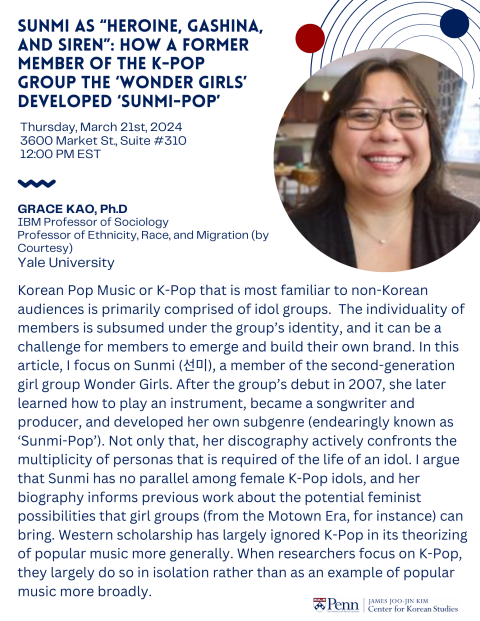
Korean Studies Colloquium
Korean Pop Music or K-Pop that is most familiar to non-Korean audiences is primarily comprised of idol groups. The individuality of members is subsumed under the group’s identity, and it can be a challenge for members to emerge and build their own brand. In this article, I focus on Sunmi (선미), a member of the second-generation girl group Wonder Girls. After the group’s debut in 2007, she later learned how to play an instrument, became a songwriter and producer, and developed her own subgenre (endearingly known as ‘Sunmi-Pop’). Not only that, her discography actively confronts the multiplicity of personas that is required of the life of an idol. I argue that Sunmi has no parallel among female K-Pop idols, and her biography informs previous work about the potential feminist possibilities that girl groups (from the Motown Era, for instance) can bring. Western scholarship has largely ignored K-Pop in its theorizing of popular music more generally. When researchers focus on K-Pop, they largely do so in isolation rather than as an example of popular music more broadly.
Grace Kao is the IBM Professor of Sociology at Yale University, and Professor of Ethnicity, Race, & Migration (by courtesy). Her research focuses on: (1) Racial, Ethnic, and Immigrant Differences in Educational Outcomes and the Transition to Adulthood; (2) Interracial Friendships and Romantic Relationships; (3) Sociology of Music, especially K-Pop and the Hallyu; and (4) Dating and Marriage in S. Korea. She regularly teaches classes on New Wave Music, K-Pop, and the Hallyu. She is the former Vice President of the American Sociological Association. She currently serves as a regular contributor to The Korea Herald, South Korea's largest English-language newspaper. According to Google Scholar, her work has been cited over 15,000 times.
 James Joo-Jin Kim Center for Korean Studies
James Joo-Jin Kim Center for Korean Studies